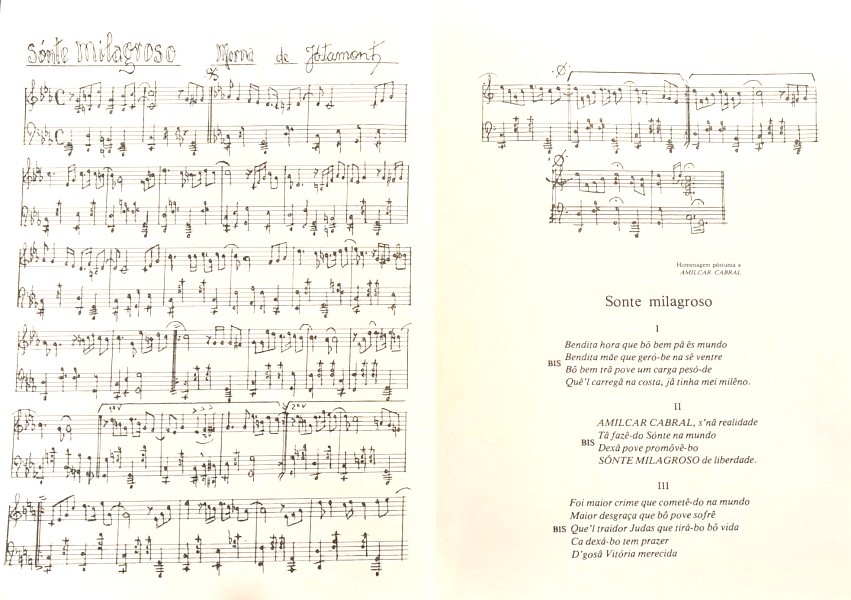50 years singing Cabral

Cabo Verde & Its Music – A Virtual Museum associates itself to the celebrations of the centennial of Amilcar Cabral by sharing compositions that talk about the political leader and thinker. Cabral is not only a significant figure in the history of Cabo Verde but also in Cabo Verdean music, with many songs mourning his death and praising his role in the trajectory of the Cabo Verdean people, who keep his memory alive. Over the past 50 years, various musical genres, including morna, koladera, samba, funaná, and reggae, have been used to sing about Cabral.
In Cabo Verde and Guinea Bissau, there are many compositions referring to Amílcar Cabral. We start our list with the lament that Tony Lima, then studying in Paris and leading the group Kaoguiamo, wrote upon learning about the murder of the freedom fighter leader. The composition is part of the LP Korda Skrabu! (1974) by Kaoguiamo: “Amilcar Cabral” (Tony Lima).*
Around the same time, Jotamonte composed his posthumous tribute. The composition was not recorded, but its lyrics and score are published in Música Caboverdeana – Mornas para Piano, box with 29 mornas by Jorge Monteiro, score and lyrics (edited by Instituto Camões, 1995).

In a chronologic sequence of recordings mentioning Amilcar Cabral, the group Voz de Cabo Verde follows with their Lisbon version in the 1970s, in which the LP Independencia (1975) recorded “Es Mata Cabral” (Jose Carlos Schwarz)*, a composition that speaks about the moment the Portuguese realized they had lost the war.
In Angola, also in 1975, Maiuka and Conjunto Merengue recorded “Viva Cabral”, on the single Batuque é Feitico/Viva Cabral (1975). The lyrics celebrate the achievements of freedom by the people of Guinea and Cabo Verde with the chorus “Viva Cabral!”.
In the following year, Os Tubaroes released their first album, Pepe Lopi, with three themes referring to Cabral, all in harmony with the political moment in Cabo Verde. “Labanta Braço” which exalts the recently conquered Independence ; “Cabral Ca Mori”, a morna that has become a true anthem to Cabral’s memory, affirming the perpetuity of his figure; and “Strela Negra” which honors the African Party for the Independence of Guinea and Cape Verde (PAIGC), who fought for freedom in these two territories and alerts to the fact that times have changed and in the new context the enemy does not have a face.
- “Labanta Braço” (Alcides Spencer Brito), LP Pepe Lopi (1976)*
- “Cabral Ca Mori” (Daniel Rendall), LP Pepe Lopi (1976)*
- “Strela Negra” (Ildo Lobo), LP Pepe Lopi (1976)*
In the following album, the LP Tchon di Morgado (1978), appears the song “Patrice Lumumba”, a poem by Ovidio Martins with music by Humberto Évora in a samba rhythm mentions other African political leaders who had died by the time of Cabral’s death: Kwame Nkruma from Ghana, and Patrice Lumumba from Congo, and also Che Guevara, murdered in 1967.
This song also appeared on albums by Nho Balta and the group Africa Star and was later recorded by Grupo Rabasa.
The composition “Cabral gritá” (author unknown), * appears on the LP Câ Nhôs Dam Gravata (1976) by África Star, while “Patrice Lumumba” is part of the LP Os Reis do Baile (1978) by the same group.
Nho Balta recorded several compositions about Amilcar Cabral in his albums.
- “Midjor Fidjo” (Nho Balta),* do LP Nho Balta Ma Voz de Pove (Terra Livre), 1977 (Mel d’Abelha, Portuguese edition).
- “Amílcar” (“Patrice Lumumba”, Ovídio Martins/Humberto Évora),* LP Nho Balta (1978). Nho Balta also used this composition on his LP Havemos de Voltar (1985).
- “Janero Na Conakry” (Pedro Rodrigues),* from LP Terra Longe (1983).
In 1977, the Black Power group and Marino Silva also sang about Amílcar Cabral.
“És Matal” (Manuel Faustino),* appears on the LP Nos Cabo Verde Di Sperança (1977), by Black Power, urging the people to continue the fight for freedom because, until they take power, they won’t have peace or security, remembering that the red color on the flag simbolizes Revolution. “África, Guiné, Cabo Verde / Mundo intero tá revoltode” (People all over the world are outraged), says the lyrics.
Marino Silva, whose career was marked by romantic mornas and joyful koladeras, joins the revolutionary wave, recording “Sacrifício de Cabral* (LP Karaté, 1977, accompanied by Voz de Cabo Verde). “Nos lider Amilcar Cabral / trabadia tanto tempo / Pa libertá se povo / Até que enfim nô tem liberdade” (Our leader, Amilcar Cabral, worked for so long / To free his people / Finally we have freedom), says the lyrics composed by Armindo Pires.
“Cabral 1924-1973” (Abel Lima)*is the title of the composition that Abel Lima recorded on his LP Goenta Canela (1979). It is a true biography of Cabral, mentioning his date of birth, his leadership ourney and his murder on 03.20.1973, when “África e mundo inteiro tchora morte di Cabral” (Africa and the whole world mourn the death of Cabral) . Cabral dominated and conquered more with his head than with weapons, states the lyrics. The envy of his wisdomd isoriented the Portuguese, sing Abel Lima, referring that even with the betrayel that lead to his murder, the independeces were conquered.
Djô, in the album Formidável, 1979, sings “Verdade de Cabral” (Armindo Pires/Manuel Sequeira Monteiro)*. Follows Pedrinho,with “Es matabo só por inveja” (Pedrinho), LP Nhós Déxa de Conta Mintira (1981), and Nanhe d´Guida, with “Amílcar Cabral” (Nanhe d’ Guida), in LP Telegrama (1982). Melody by “Djonsinho Cabral” with different lyrics, more explicit mentioning Cabral’s death.
José Augusto, with “Mata Cabral”,* album not identified, but appears in the compilation Evocação de Amílcar Cabral no Folclore Cabo-Verdiano, is other composition of this time, praising the PAIGC and condemning Cabral’s muder by the Portuguese.
Pedro Ramos and Jacinta Sanches, in the self-titled LP from 1986 appears with the reggae “Minino Ki Naçi Onti (viva Cabral)”. The lyrics mention the older times where people would die of starvation and shouts “Viva!” by the Fighters and for the freedom achieved.
Fast forward to the end of the 1990s, we have the Cabo Verde Show with the salsa, “Amilcar Cabral”,* whose lyrics dialogue with Cabral, showing him how Cabo Verde is progressing. The theme is part of the LP La Coladeira (1999, reedited in CD in 2006).
In 2007, Mario Lúcio, in the album Badyo, records the composition that he wrote, “Diogo e Cabral”, in which he comments that Diogo Gomes (the Portuguese navigator who found the Cape Verde islands in the 15th century) has his statue at the top of the Plateau (historic center of Praia), alongside with the Republic Presidency and overlooking the parliament, while Amilcar Cabral has his representation in the Varzea neighborhood facing the cemetery.
The group Rabasa, in turn, who recorded in 2008 in the CD Portucabo the poem by Ovídio Martins, music by Humberto Évora, released in 2024 the digital single “Homi di povu” (João Ortet), thus joining the celebration of the centennial of Cabral.
Camilo Montrond, on his CD Saluss (2013), sings “Nos Cabral”, accompanied by the acoustic guitar, recording in Chã das Caldeiras: “Kenha ki mori ki sol nega limia? / kenha ki mori ki lua tchora?” / Era nosso midjor amigo / Era nosso midjor heroi.” (Who died that made the sun refuse to shine? Who died, making the moon cry? He was our greatest friend / He was our greatest hero.)
Jovino dos Santos, on the other hand, releases the digital single “Ode a Amilcar Cabral”, this year that celebrates the centennial. “Pa combate es kolonismo bo nascê na terra longe / Bo cria na Cabo Verde / Oji bo nome ta escrito na história de África…” (To combat colonialism, you were born in a land far away / You grew up in Cape Verde / today your name is written in the history of Africa) wrote Jovino.
Maribel Veiga presents her version of Tony Lima’s song in this video:
Terreru, group formed by Calu di Guida, Maruka Tavares, Jacinto Fernandes, Djinho Barbosa and Djoy Amado, presents its tribute to Amílcar Cabral, based on a poem by Emanuel Braga Tavares.
Other contributions appear when the date of Cabral’s centenary is celebrated, September 12, 2024. Pedrinho Nova (songwriter) and the singer Mindela Soares present “Conciencia di Kabral”, in a video music recorded at the Amilcar Cabral memorial, in Praia City.
In turn, young talent Joshua Marty appears with a composition written by Calu di Guida, “Cabral e bo”. Both works with production of Kim Alves.
In the Cape Verdean community in the United States, the song ‘Nu onra Cabral’ (Norberto Tavares) is performed by singer Desiree Fernandes. Produced by Jacinto Fernandes and Desiree. Arrangements by Jacinto Fernandes and Djinho Barbosa.
Among rap artists, there are numerous creations that mention Cabral and his influence, with an entire page dedicated to them. Check it out:
Glossary of terms and titles of some songs in Cape Verdean language
- Korda Skrabu! – wake up, slave!
- Es Mata Cabral – They killed Cabral
- Labanta Braço – Raise your arm, celebrate freedom
- Cabral Ca Mori – Cabral did’t die
- Strela Negra – Black Star (PAIGC symbol)
- Cabral gritá – Cabral screamed
- Mata Cabral – To kill Cabral
- Es matabo só por inveja – They killed you just out of envy
- Homi di povo – Man of the people
- Verdade de Cabral – Truth about Cabral
- Midjor Fidjo – the best son
- Sacrifício de Cabral – Cabral’s sacrifice
* Recording inserted in the compilation Evocação de Amílcar Cabral no Folclore Cabo-Verdiano, vol. 4 from the series “Música Cabo-Verdiana por Temas”, produced and edited by Alberto Rui Machado in 2003.
Thanks for contributing to the creation of this page: Francisco Sequeira, Heloisa Monteiro, Jorge Borges.